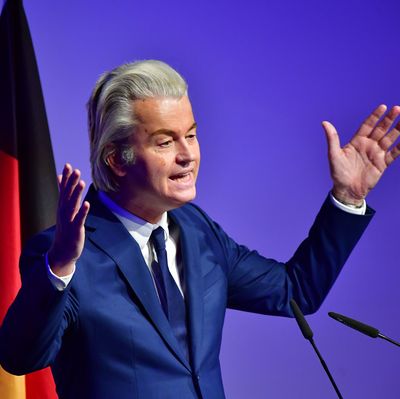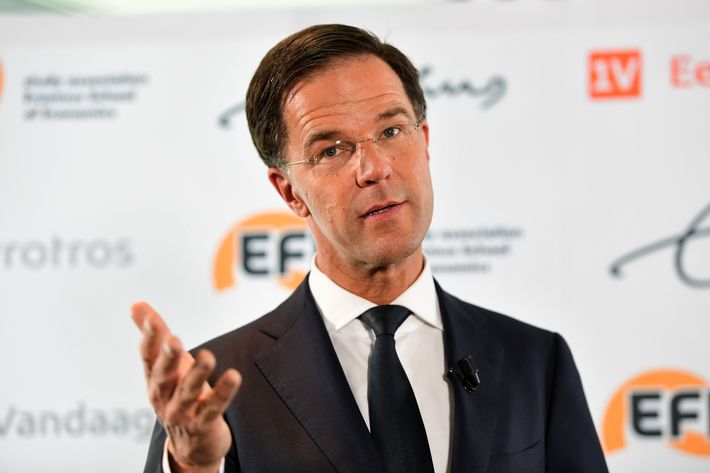
Following the unexpected success of Brexit and Donald Trump, right-wing populism will face its next test on Wednesday when Dutch voters head to the polls. Voting in the Netherlands is based on proportional representation, so parties will be awarded a percentage of the 150 seats in the Tweede Kamer, the country’s lower house of parliament.
While the Dutch vote for parties, not individual politicians, the election has been dominated by Geert Wilders, a far-right, anti-Islamic candidate who’s been compared to Trump. Wilders became embroiled in a U.S. controversy over the weekend when Republican congressman Steve King tweeted a cartoon endorsing him. “Wilders understands that culture and demographics are our destiny,” King wrote. “We can’t restore our civilization with somebody else’s babies.”
Who Is Geert Wilders?
Wilders has been called the “Dutch Trump,” and as the New York Times reported last month, they share a number of similarities:
Like Mr. Trump, Mr. Wilders is unafraid to say things in the most direct, divisive, dismissive, and often disparaging and insulting of ways. Similar to Mr. Trump, many of his supporters feel buoyed and relieved that he is giving voice to what they cannot say, or feel they are not supposed to say.
Wilders even has some ties to Republicans in the U.S. During the 2016 election, he voiced his support for Trump, adopted the slogan “Make the Netherlands Great Again,” and attended the “Milo Yiannopoulos Wake Up Party” during the Republican National Convention. He’s also received contributions from U.S. conservatives.
However, there are significant differences between the two men. Wilders began working in politics in 1990 at the age of 28, and is one of the longest-serving members in the Dutch lower house. Rather than the “Dutch Trump,” Politico described Wilders as “the man who invented Trumpism.”
“He’s the most strategic, smartest politician out there,” Sarah de Lange, a political science professor at the University of Amsterdam, told the Times. “He’s very skilled. He’s a very good debater. He has media savvy. Internationally, he’s compared to Trump. But with Wilders every tweet is thought through, calculated. With Trump it’s emotional.”
Wilders’s political views are more consistent, and more extreme, than Trump’s. He has called for closing all mosques in the Netherlands, banning the Koran, and taxing women who wear the hijab. In December, he was convicted of inciting discrimination with comments he made about Dutch Moroccans, but he continued insulting the group.
“The Moroccan scum in Holland … once again not all are scum … but there is a lot of Moroccan scum in Holland who make the streets unsafe, mostly young people … and that should change,” he told journalists last month.
Wilders is the target of so many threats that he’s been under constant police protection since 2004, and lives in a government safe house.
Which Parties Are Running?
Voters will choose between 28 parties, and the March 15 election is likely to produce the most fragmented political landscape in Dutch history. Four to six parties will probably have to band together to form a government. These are the major groups:
• The People’s Party for Freedom and Democracy (VVD): The party of current prime minister Mark Rutte. The liberal party has held a majority in the government since 2012, and recent polls suggest they may come in first again, though they’ll lose seats.
• The Labour Party: The Labour Party came in second in the last election, and governed in coalition with VVD. They’ve been criticized for supporting austerity measures and are expected to lose seats.
• The Christian Democratic Appeal: The center-right party has participated in all but three Dutch governments since 1977.
• The Democrats 66: A progressive and pro-E.U. party, which favors legalized marijuana, same-sex marriage, euthanasia, and prostitution.
• The Green Left: A party popular with young people, which is attempting to move from being a minor party to a major player in the new government.
• The Party of Freedom: The nationalist, right-wing party Wilders founded in 2004. It’s anti-immigration and in favor of the Netherlands leaving the E.U.

What Do the Polls Say?
For the last year, polls showed Wilders’s Party of Freedom in the lead, but in the last month Prime Minister Mark Rutte’s VVD pulled slightly ahead. Reuters reported that the latest poll from Maurice De Hond had VVD winning 18 percent of the vote and 27 seats, and the Freedom Party in second place with 16 percent and 24 seats.
But on Monday Rutte warned voters not to be complacent. “There is a real risk that on March 16 we can wake up in this country and Geert Wilders is leading the biggest party and that will send a signal to the rest of the world,” he told reporters.
Is Wilders Likely to Become Prime Minister?
No. In the Netherlands, winning the popular vote does not mean you get to lead the country — but it has nothing to do with the Electoral College. After the election, the parties will begin negotiating to form a governing coalition, a process that could take months. All of the mainstream parties have vowed not to work with Wilders, so it’s highly unlikely that he will become prime minister (though he claims they’ll change their tune if he wins).
Wilders’s popularity is still significant, however, because he’s shifted Dutch politics to the right. The leader of the Christian Democratic Alliance said that if Europe doesn’t reform “Brexit might not be the last exit from the E.U.” Prime Minister Rutte tried to compete with Wilders rather than standing in opposition to him.
“If you don’t like it here, you can leave,” he said on the campaign trail earlier this month — though he added that the statement applies to everyone, “be it that you are an immigrant, or that your parents and grandparents were born here.”
Last month the Dutch law society NoVA concluded that the platforms of all five leading parties contain policies that are “openly discriminatory against certain population groups.”
What Does the Election Mean for Europe?
While Wilders is in favor of “Nexit,” that wasn’t a major campaign issue and most of the other parties are against holding a referendum on E.U. membership. On the other hand, just after the Brexit vote, a poll found 43 percent of the Dutch wanted to vote on their membership in the E.U. Several parties are in favor of reforms, even though they want to remain in the E.U.
With elections approaching France, Germany, and maybe Italy, the Dutch vote may be an indicator of whether Brexit and Trump were isolated events or the beginning of a widespread embrace of right-wing populism.






























